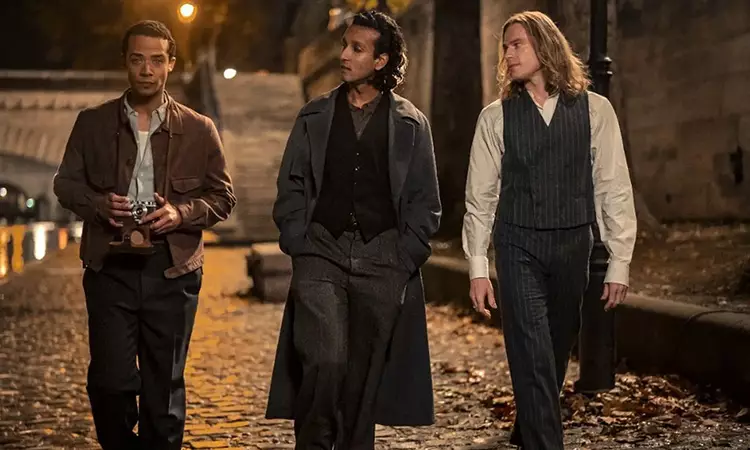Adapting Anne Rice’s iconic work, “Interview with the Vampire,” has always been a daunting task. The intricate layers of her characters and the melodic prose that captivates readers since the 1970s posed significant challenges for any filmmaker or showrunner aiming to translate such a beloved narrative to the screen. While the 1994 film adaptation featuring Brad Pitt and Tom Cruise left indelible marks on cinema, the recent television series has elevated the story to a level that resonates powerfully with contemporary audiences. Season One laid a bedrock of gothic richness and emotional depth, but Season Two boldly ventures even deeper into the abyss, pushing the boundaries of character exploration and thematic richness.
Season Two of “Interview with the Vampire” ascends to darkly dramatic heights as it follows a newly imagined journey for our antiheroes. Picking up after Season One’s tumultuous finale, Louis de Pointe du Lac (Jacob Anderson) and the ever-intense Claudia (Bailey Bass) find themselves traversing the remnants of a ravaged Europe in the aftermath of World War II. Their quest to connect with others of their kind leads them to Paris, a setting lush with dark beauty, where they encounter Armand (Assad Zaman) and his theater troupe composed of vampires. The dynamic within this coven complicates their mission of survival, entangling them in a web of intrigue layered with Lestat de Lioncourt’s (Sam Reid) haunting presence. The season’s progression amplifies the tension as loyalties are challenged and the foreboding atmosphere thickens, promising captivating drama.
The performances in this season are nothing short of electrifying. Jacob Anderson excels further in his portrayal of Louis, embodying a deep-seated vulnerability intertwined with a palpable sense of existential dread that defines his character. As the weight of immortality weighs heavily on him, Louis grapples with the nuances of guilt and morality, raising fundamental questions about identity that resonate profoundly with viewers today. His struggles are not merely personal; they echo broader themes of belonging and the search for purpose that many can relate to.
In contrast, Sam Reid’s Lestat is a force of nature, simultaneously alluring and terrifying. The character’s charm is double-edged, as Lestat’s insatiable thirst for power and control often leads to devastating consequences for those around him. Reid masterfully navigates Lestat’s emotional spectrum, capturing the heartbreaking duality of a character who is both magnetically charismatic and deeply flawed. The interplay between Louis and Lestat becomes a vital axis around which much of the season’s drama revolves, offering a complex portrayal of love tinged with jealousy and manipulation.
Meanwhile, Claudia’s evolution under Bailey Bass’s nuanced performance is remarkable. The character transforms from a child trapped in eternal youth to a more complex figure navigating feelings of loneliness and desperation. Bass imbues Claudia with a fiery resilience that makes her journey compelling. The struggles she faces—balancing her youthful exuberance with the stark reality of her undead existence—provide a rich narrative thread that keeps viewers invested in her arc.
The television series takes a contemplative approach as it plunges into the philosophical quandaries of immortality. Season Two effectively distinguishes itself by examining not just the tantalizing allure of eternal life, but the consequent isolation and psychological toll it exacts on its characters. By weaving time jumps into modern scenarios—such as Louis and Armand in contemporary Dubai—the narrative highlights the enduring nature of their struggles as they confront the ghosts of their pasts while faced with modern dilemmas.
Themes of identity permeate the narrative, facing Louis’ experiences as a black vampire within a nuanced representation of power dynamics, race, and queerness. The show tackles these subjects with unwavering attention, ensuring that it reflects present-day discourse while remaining faithful to Rice’s original vision.
Even Lestat’s character arc takes a dark shift, illuminating the destructive path of unchecked ambition and emotional turmoil. His relationship with Louis reveals layers of toxicity, fraught with the allure of power and the dangers it entails. The emotional manipulation present in their interactions serves as a stark reminder of love’s complexities, enriching the overall narrative.
Ultimately, Season Two of “Interview with the Vampire” not only builds upon the established legacy of its source material but redefines it through a lens of modern relevance. The rich storytelling, combined with exceptional performances from Anderson, Reid, and Bass, results in a captivating exploration of love, power, and the burdens of immortality. As viewers are drawn into this complex tapestry of gothic allure and emotional intensity, one can only anticipate how these characters’ journeys will unfold in the seasons to come. This adaptation not only honors the beloved original but also successfully revitalizes it, ensuring that its rich narrative remains compelling to both old fans and new audiences alike.

